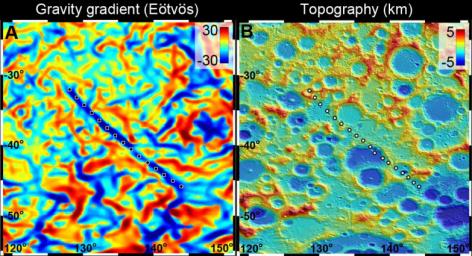
|
GRAIL Spots Gravity Anomaly
- Click the image above for a larger view
- Full-Res JPEG (1065 x 578) (167.0 kB)
- Full-Res TIFF (1065 x 578) (1.8 MB)
Caption:
A 300-mile-long (500 kilometer-long) linear gravity anomaly on the far side of the moon has been revealed by gravity gradients measured by NASA's GRAIL mission. GRAIL data are shown on the left, with red and blue corresponding to stronger gravity gradients. Topography data from NASA's Lunar Reconnaissance Orbiter's Lunar Orbiter Laser Altimeter for the same region show a surface saturated with craters (red is higher terrain and blue is lower). The lack of any topographic signature over the gravity anomaly indicates that it is older than the craters, and thus is one of the oldest features on the moon.
The units of the gravity gradients are Eötvös, and of the topography are kilometers.
Background Info:
NASA's Jet Propulsion Laboratory in Pasadena, Calif., manages the GRAIL mission for NASA's Science Mission Directorate in Washington. The Massachusetts Institute of Technology, Cambridge, is home to the mission's principal investigator, Maria Zuber. GRAIL is part of the Discovery Program managed at NASA's Marshall Space Flight Center in Huntsville, Ala. Lockheed Martin Space Systems in Denver built the spacecraft. The California Institute of Technology in Pasadena manages JPL for NASA.
For more information about GRAIL, please visit http://grail.nasa.gov .
Cataloging Keywords:
| Name | Value | Additional Values |
|---|---|---|
| Target | Moon | |
| System | Earth | |
| Target Type | Satellite | |
| Mission | GRAIL | Lunar Reconnaissance Orbiter (LRO) |
| Instrument Host | GRAIL | |
| Host Type | ||
| Instrument | ||
| Detector | ||
| Extra Keywords | Color, Crater | |
| Acquisition Date | ||
| Release Date | 2012-12-05 | |
| Date in Caption | ||
| Image Credit | NASA/JPL-Caltech/CSM | |
| Source | photojournal.jpl.nasa.gov/catalog/PIA16581 | |
| Identifier | PIA16581 | |
